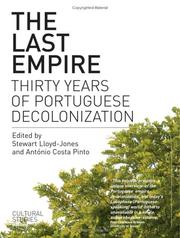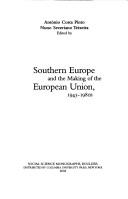| Listing 1 - 10 of 15 | << page >> |
Sort by
|
Dissertation
Year: 1880 Publisher: Montpellier : s.n.,
Abstract | Keywords | Export | Availability | Bookmark
 Loading...
Loading...Choose an application
- Reference Manager
- EndNote
- RefWorks (Direct export to RefWorks)
Book
ISBN: 1351046896 135104690X 1351046918 1857439619 Year: 2019 Publisher: Milton Taylor & Francis Group
Abstract | Keywords | Export | Availability | Bookmark
 Loading...
Loading...Choose an application
- Reference Manager
- EndNote
- RefWorks (Direct export to RefWorks)
Book
ISBN: 3319981528 331998151X Year: 2019 Publisher: Cham : Springer International Publishing : Imprint: Palgrave Macmillan,
Abstract | Keywords | Export | Availability | Bookmark
 Loading...
Loading...Choose an application
- Reference Manager
- EndNote
- RefWorks (Direct export to RefWorks)
This book examines how patterns of political representation, party system, and political culture have changed in Southern Europe following the “Great Recession” of 2008. It draws on the experience of Portugal to argue that austerity measures have significantly deepened the legitimacy crisis of democratic institutions, but the resilience of party system is remarkable in comparison. The case of Portugal present some interesting differences from other southern European democracies, since on one hand it suffered a deep economic crisis and the consequent bailout from the International Monetary Fund, the European Central Bank and the European Union, but on the other hand the party system remained stable. Nevertheless the impact of the crisis did reinforce a centre-periphery cleavage within the European Union, and especially in the Eurozone, Portugal is a central element of this new cleavage notoriously aggravated by the Brexit.
Europe-Politics and government. --- Elections. --- Comparative politics. --- Democracy. --- European Politics. --- Electoral Politics. --- Comparative Politics. --- Self-government --- Political science --- Equality --- Representative government and representation --- Republics --- Comparative political systems --- Comparative politics --- Government, Comparative --- Political systems, Comparative --- Electoral politics --- Franchise --- Polls --- Politics, Practical --- Plebiscite --- Political campaigns --- Europe—Politics and government.

ISBN: 1280476907 9786610476909 1841508977 9781841508979 1841501093 9781841501093 9781280476907 661047690X Year: 2003 Publisher: Bristol, UK Portland, OR Intellect
Abstract | Keywords | Export | Availability | Bookmark
 Loading...
Loading...Choose an application
- Reference Manager
- EndNote
- RefWorks (Direct export to RefWorks)
This book is the result of a conference organised by the Contemporary Portuguese Political History Research Centre (CPHRC) and the University of Dundee that took place during September 2000. The purpose of this conference, and the resulting book, was to bring together various experts in the field to analyse and debate the process of Portuguese decolonisation, which was then 25 years old, and the effects of this on the Portuguese themselves. For over one century, the Portuguese state had defined its foreign policy on the basis of its vast empire &endash; this was the root of its 'Atlanticist' v
Decolonization --- Sovereignty --- Autonomy and independence movements --- Colonization --- Postcolonialism --- Europe --- Council of Europe countries --- Eastern Hemisphere --- Eurasia --- Colonies --- History.

ISBN: 0880339918 Year: 2002 Publisher: New York (N.Y.) : Columbia university press,
Abstract | Keywords | Export | Availability | Bookmark
 Loading...
Loading...Choose an application
- Reference Manager
- EndNote
- RefWorks (Direct export to RefWorks)
Book
ISBN: 3031119096 303111910X Year: 2023 Publisher: Cham Springer International Publishing AG
Abstract | Keywords | Export | Availability | Bookmark
 Loading...
Loading...Choose an application
- Reference Manager
- EndNote
- RefWorks (Direct export to RefWorks)
Book
Year: 2010 Publisher: Project Gutenberg
Abstract | Keywords | Export | Availability | Bookmark
 Loading...
Loading...Choose an application
- Reference Manager
- EndNote
- RefWorks (Direct export to RefWorks)

ISBN: 0415384923 0415419832 9780415384926 9780415419833 9781315824321 9781317834519 9781317834526 9781317834533 Year: 2007 Publisher: London Routledge
Abstract | Keywords | Export | Availability | Bookmark
 Loading...
Loading...Choose an application
- Reference Manager
- EndNote
- RefWorks (Direct export to RefWorks)
Book
ISBN: 3319623133 3319623125 Year: 2018 Publisher: Cham : Springer International Publishing : Imprint: Palgrave Macmillan,
Abstract | Keywords | Export | Availability | Bookmark
 Loading...
Loading...Choose an application
- Reference Manager
- EndNote
- RefWorks (Direct export to RefWorks)
This book provides an in-depth analysis of the ‘technocratic shift’ in ministerial recruitment, measuring its extent and variations over time in fourteen European countries. It addresses the question: who governs in European democratic regimes? Just a few decades ago, the answer would have been straightforward: party-men and (fewer) party-women. More recently, however, and in varying degrees across Europe, a greater proportion of non-politicians or experts have been recruited to government, as exemplified by the 2017 election of Emmanuel Macron to the French Presidency. These experts, frequently labelled “technocrats”, increasingly occupy key executive positions and have emerged as powerful actors in the decision-making process. This edited collection explores the contemporary debates surrounding the relationship between technocracy, democracy and political leadership, and will appeal to scholars and advanced students interested in these fields. .
Democracy --- Europe --- Politics and government. --- Self-government --- Political science --- Equality --- Representative government and representation --- Republics --- Politics --- Political leadership. --- Europe-Politics and government. --- Comparative politics. --- Democracy. --- Political Leadership. --- European Politics. --- Comparative Politics. --- Leadership --- Comparative political systems --- Comparative politics --- Government, Comparative --- Political systems, Comparative --- Europe—Politics and government. --- Comparative government. --- Political science. --- Political Science. --- Administration --- Civil government --- Commonwealth, The --- Government --- Political theory --- Political thought --- Science, Political --- Social sciences --- State, The --- Gay culture Europe
Book
ISBN: 303052535X 3030525341 Year: 2020 Publisher: Cham : Springer International Publishing : Imprint: Springer,
Abstract | Keywords | Export | Availability | Bookmark
 Loading...
Loading...Choose an application
- Reference Manager
- EndNote
- RefWorks (Direct export to RefWorks)
This book constitutes the refereed proceedings of the 1st International Congress on Blockchain and Applications 2020, BLOCKCHAIN’20, held in L’Aquila, Italy, in October 2020. Among the scientific community, blockchain and artificial intelligence are a promising combination that will transform the production and manufacturing industry, media, finance, insurance, e-government, etc. Nevertheless, there is no consensus with schemes or best practices that would specify how blockchain and artificial intelligence should be used together. The 21 full papers presented were carefully reviewed and selected from over 40 submissions. They contain the latest advances on blockchain and artificial intelligence and on their application domains, exploring innovative ideas, guidelines, theories, models, technologies, and tools, and identifying critical issues and challenges that researchers and practitioners must deal with in future research. .
Blockchains (Databases) --- Artificial intelligence. --- AI (Artificial intelligence) --- Artificial thinking --- Electronic brains --- Intellectronics --- Intelligence, Artificial --- Intelligent machines --- Machine intelligence --- Thinking, Artificial --- Bionics --- Cognitive science --- Digital computer simulation --- Electronic data processing --- Logic machines --- Machine theory --- Self-organizing systems --- Simulation methods --- Fifth generation computers --- Neural computers --- Block chains (Databases) --- Database security --- Distributed databases --- Engineering—Data processing. --- Computational intelligence. --- Data Engineering. --- Computational Intelligence. --- Artificial Intelligence. --- Intelligence, Computational --- Artificial intelligence --- Soft computing
| Listing 1 - 10 of 15 | << page >> |
Sort by
|

 Search
Search Feedback
Feedback About UniCat
About UniCat  Help
Help News
News